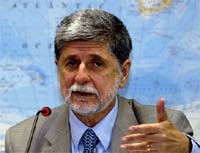|
 Mumbai: The 35-member developing county grouping refused to yield ground against pressure mounted by rich countries to open up their economies in return for hardly anything from the developed world. Mumbai: The 35-member developing county grouping refused to yield ground against pressure mounted by rich countries to open up their economies in return for hardly anything from the developed world.
 Brazilian foreign minister Celso Amorim slammed Monday's talks as ''totally useless'' even as ministers resumed crucial trade talks today in the absence of Indian trade minister Kamal Nath who is in New Delhi connection with the crucial trust vote. Brazilian foreign minister Celso Amorim slammed Monday's talks as ''totally useless'' even as ministers resumed crucial trade talks today in the absence of Indian trade minister Kamal Nath who is in New Delhi connection with the crucial trust vote.
With Monday's negotiations on the Doha Round of the world trade talks failing to break the western subsidy barrier, developing countries have hardened their positions over tariff reductions and market opening. Commerce minister Kamal Nath, currently in New Delhi to vote on the confience motion will be back in Geneva on 24 July. The rich nations, including the US and EU and the developing countries, spearheaded by emerging economies like India, Brazil and South Africa blame each other for stalling a multilateral negotiations on liberalising global trade. ''14 years after the Uruguay round of talks was concluded, you are still having subsidies in hundreds of billions of dollars. No actual reduction has taken place," commerce secretary Gopal Pillai told the rich countries. US trade representative Susan Schwab and EU trade commissioner Peter Mandelson also talked tough before joining parallel negotiations that are scheduled to run for five days. ''We are looking forward to seeing the contributions of others, including of the most significant emerging markets (to clinch a deal at this Geneva meet this week)," Schwab said. Mandelson said an agreement was now conditional on developing countries making real cuts in industrial tariffs. ''They must be real... That is the political bottom line. Nothing else will work for us. Nothing else will close the deal," he said. The world trade negotiations, launched in 2001, were to be completed by the end of 2004 for a new trade regime. But the insistence of WTO director general Pascal Lamy and US president George Bush that American business must get a new opportunity and the subsequent pressure mounted to achieve an agreement on that basis prolonged the talks with no end in sight. While the number of differences has come down, the countries stuck to their positions when it came to the crunch of seeking new markets for themselves and protecting own markets. With tariff flexibilities and subsidy cuts remaining a major bone of contention at the WTO mini-ministerial negotiations, a successful conclusion will depend on either parties yielding ground. The extend to which countries are willing to yield ground, however, is still unknown.
While tariff flexibilities are important for addressing the legitimate concerns of India's MSME (micro, small and medium enterprises) and sensitive sectors such as automobiles, auto components, textiles, marine products and chemicals, India is batting for effective market access in the areas of professional and other business services in developed countries. India is a key party in the negotiations as it rallies behind it developing nations. New Delhi, however, is unlikely to sacrifice the interests of its fledgling service sector or those of the country's millions of subsistence farmers to clinch a global trade deal.
|